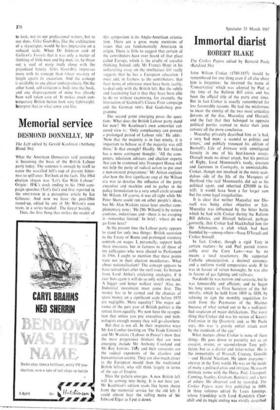Memorial service
DESMOND DONNELLY, MP
The Left edited by Gerald Kaufman (Anthony Blond 30s)
What the American Democrats said yesterday is becoming the basis of the British Labour party today. The sentence is enough by itself to cause the so-called left's cup of present bitter- ness to spill over. Yet look at the factS. The 1964 election slogan was 'Let's Go With Labour.' Origin: JFK's stock ending to his 1960 cam- paign speeches ('Let's Go') and first reported in the SPECTATOR in a perceptive article by Ian Gilmour. And now we have the post-1966 round-up, edited by one of Mr Wilson's own team, in a series headed: The Great Society.
Thus, the first thing that strikes the reader of
this symposium is its Anglo-American orienta- tion. There are a great many mentions of issues that are fundamentally American in origin. There is little to suggest that certain of the contributors have ever heard of that place called Europe, which is the cradle of socialist thinking. Indeed, only Mr Francis Hope in his unflattering essay on the intellectual left really suggests that he has a European education. I must add, in fairness to the contributors, that their terms of reference must have been, tacitly, to deal only with the British left. But the subtle and fascinating fact is that they have been able to do so without examining, for example, the interaction of Gaitskell's Clause Four campaign and the German sPo's Bad Godesberg pro- gramme.
The second point emerging poses the ques- tion: What does the British Labour party stand for now? Mr Kaufman's own somewhat col- oured view is: 'Only complacency can prevent a prolonged period of Labour rule.' He adds: 'Now that the majority is in fact ninety, it is important to behave as if the majority was still three.' Is that enough? Hardly. Mr Ian Aitken has a more astringent thought: 'All the com- puters, television advisers and election experts that can be crammed into Transport House will not help the party of radical action to put over a non-existent programme.' Mr Aitken explains also how the first significant step of the Wilson era was to devalue the influence of the party executive and machine and to gather in the policy formulation to a very small circle around Mr Wilson. Of course, it was all right while Mr Peter Shore could run on other people's ideas, but Mr Alan Watkins raises later another com- plementary note: 'He [Mr Wilson] is by nature cautious, industrious and—there is no escaping it—somewhat limited.' In brief : where do we L;o from here?
At the present time the Labour party appears to stand for only two things: British accession to the Treaty of Rome and prolonged statutory controls on wages. I, personally, support both these measures, but in fairness to all those of my colleagues who were elected to Parliament in 1966, I ought to mention that these points were not in their election manifestoes. What about nationalisation? The concept appears to have retired hurt after the steel issue. To borrow from Lord Attlee's cricketing analogies, if it ever bats again it will do so only with one hand. A bigger and better welfare state? Alas, no. Industrial investment must come first. The money has to be earned and the chances of spare money on a significant scale before 1975 are negligible. More equality? The major ad- vance of the past year of British politics is the retreat from equality. We now have the recogni- tion that unless you pay executives and tech- nologists enough money they will go elsewhere.
But that is not all. In their respective ways Mr Ian Coulter (writing on 'The Trade Unions') and Mr Watkins ('Labour in Power') show that the most progressive thinkers that are now emerging include Mr Anthony Crosland and Mr Roy Jenkins. They and their associates are the radical exponents of the classless and humanitarian society. They are also much closer to the European mould than the traditional British leftists, who still think largely in terms of the age of Empire.
Thus the pattern emerges. A new British left will be coming into being. It is not here yet. Mr Kaufman's edition reads like hymn sheets from the memorial service for the old left. I could almost hear the rolling notes of Sir Edward Elgar as I put it down.






























 Previous page
Previous page